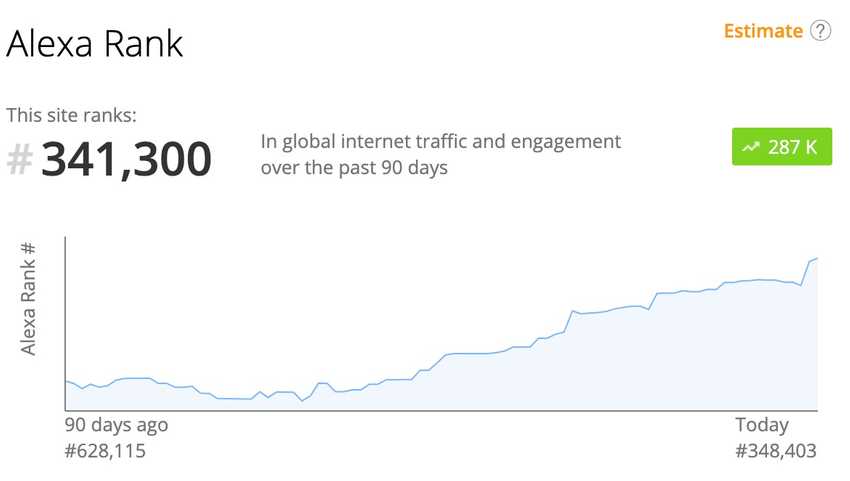Here’s how much traffic and engagement has increased on my website over the span of 90 days (from March 2020 to May 30th, 2020):

That’s almost 300k positions up on Alexa Rank in 3 months.
Alexa Rank is an indicator of the amount of traffic and engagement your website receives over time. It gets updated every 24 hours.
My Google Analytics tells the same story. I went from around 300 daily visitors in March to almost 900 daily visitors per day in May.
From October 11th, 2019, until May 2020, I hadn’t done any external promotion of my site (also known as “off-page SEO”). I wanted to see how quickly and how high I could rank on Alexa by solely focusing on growing my website in terms of content while improving the UI/UX along the way.
It turns out that you can get pretty damn far by solely focusing on your on-page SEO, which at least anecdotally proves an SEO theory I’ve had for many years, that on-page SEO is way more important than off-page SEO if your aim is to boost your organic (non-paid traffic). Sure, backlinks (off-page SEO) are important, but if you build it they will come.
Now that I have enough data to prove that solely focusing on on-page SEO is a viable strategy, I’ve slowly started to post links to my best articles on a couple of tech feeds. After all, it doesn’t hurt to have excellent off-page SEO as well.
So how did I get here?
On October 11th, 2019 I made a decision to write and publish an educational post here on TechStacker every single day.
I have many motivations behind this decision. One of them is that I want to make this website a viable source of income, either directly or indirectly. I don’t believe in having a single-income stream, because if you lose the one, and the timing is bad (when isn’t it?) you can lose everything.
To make a website a source of income you need to improve your visibility on the web, and one of the best ways to do that is to continuously expand the surface of your domain, by publishing valuable content that helps people — frequently.
Why is frequency important for SEO? Because in many ways, SEO is a numbers game. SEO is largely (but not exclusively) a game of using the right keywords, as well as the frequency of those keywords.
The bigger the surface of your website is the more room you have for adding keywords, which increases the odds of people finding your content.
I’ll be honest, the first 4-5 months of publishing posts daily, I didn’t get much traffic. It went up and down. My global Alexa Rank kept stagnating around the top 650,000 (which isn’t bad, but not great either). Some days I could have as little as 30 visitors, other days as much as 120. Then come late March 2020, I suddenly started to see some consistent upward bumps in my Alexa Rank.
I suspect that the terrible event of the Coronavirus (Covid-19) which caused millions of people to stay home, also made a lot more people search for tech-related topics. However as of May 30th, 2020, the world is slowly starting to open up again, but I’ve seen no reduction in traffic, on the contrary.
One explanation for TechStacker’s continuous rise in the Alexa Rank could be that a lot of people have lost their jobs, and are still at home. Another explanation could be that a lot more people have become interested in online education, now that they’ve had some time to reevaluate their life and acquire new skills to make themselves more valuable.
Rarely in life do things happen because of 1 variable, so the most likely reason is that after months of daily writing the compound effect has started to kick in.
Either way, this massive spike in traffic would never have happened if I didn’t make that decision to become a prolific educational writer in the fall of 2019. I’m now more motivated than ever to keep moving forward.
Eventually, I’ll open up for getting sponsors on this site, but I won’t compromise the quality of the site by smearing hideous ads everywhere. Only relevant, quality tech sponsors will be allowed to advertise here.
Eventually, my plan is to begin selling educational material as well in the shape of ebooks and video courses. First things first, for now, my focus is 100% on getting better at writing concise and easy-to-understand tech tutorials, and continue climbing the Alexa Ranks.